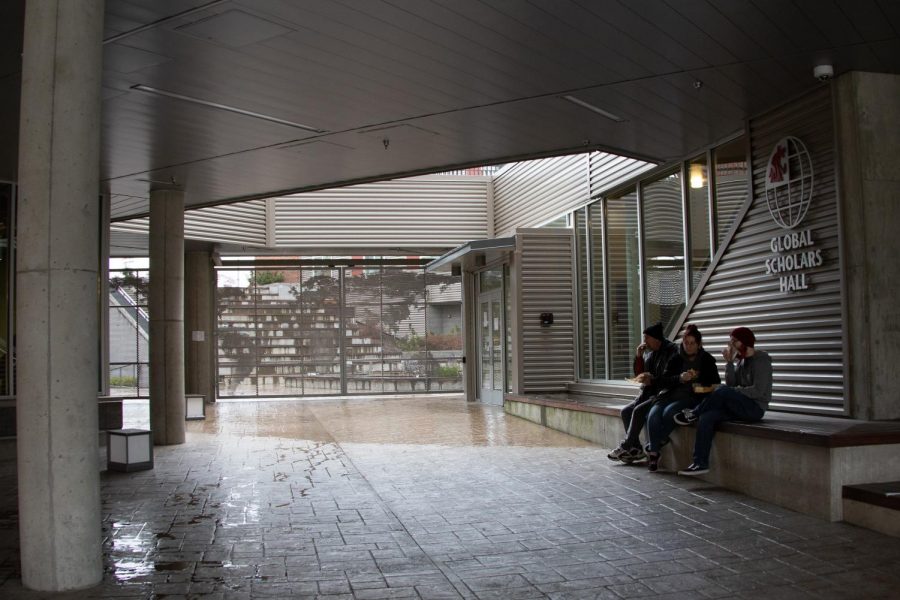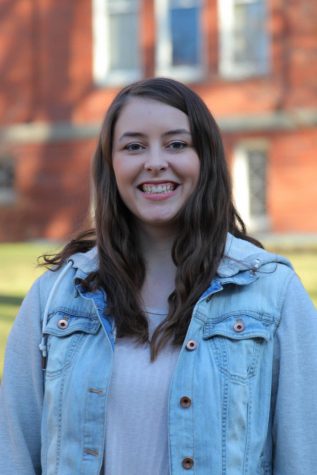Students return to campus with more choices for in-person classes
Provost approved 67 on-campus courses; arrival testing required for those planning to use facilities
Campus visitors and those living in residence halls or on-campus apartments are required to take a COVID-19 test upon arrival.
January 18, 2021
A WSU professor spent her winter break setting up her lab full of industry-grade sewing machines, colorful fabrics and socially-distant tables.
Manal Shaheen, apparel, merchandising, design and textiles professor, will welcome students into her classroom Tuesday, as long as they mask up and follow COVID-19 protocols set by the university.
Shaheen teaches two courses online and two in the lab. Her introductory class is composed mostly of freshmen who do not own sewing machines, she said.
Craig Parks, vice provost for system innovation and policy, said the university approved 67 in-person courses for spring, compared to the 35 held in the fall.
“If we hit little hiccups or speed bumps along the way, I’m highly confident that everybody associated with WSU is going to say, ‘Yep, we can handle that,’” Parks said.
Deans from all colleges applied for approval of in-person courses through the Office of the Provost. Parks said the application had to show an extreme difficulty teaching the class online, such as requiring a hands-on learning component.
Students studying chemical engineering cannot handle hazardous chemicals without being in a lab, while those learning to weld cannot learn without actually using the equipment, he said.
WSU’s Environmental Health and Safety department determined airflow requirements for classrooms, meeting rooms and other campus spaces, Parks said. The rate of air exchange tracks the number of changes in the air per hour, which is determined to effectively remove any contaminants.
Certain buildings have older HVAC or ventilation systems, which are limited because of their age, he said.
Faculty are responsible for making accommodations for students who must take in-person courses but cannot be physically in Pullman, Parks said. In addition, if a student were to contract COVID-19, each faculty member must create plans for online instruction.
All professors teaching in-person courses were required to take training modules about COVID-19 protocols, he said.
For Shaheen, each class has about 18 students. This surpasses the 10-person limit, so the group is split into two. She said each cohort will meet twice a week for five hours each, instead of the normal three-hour meetings.
Requirements for students during class include having their temperatures taken, wearing face masks and sanitizing their stations before leaving, she said.
Shaheen said only one incident occurred last semester when a student was exposed to COVID-19 but tested negative.
“We received a lot of feedback from our in-person instructors in the fall, telling us that not only were students adhering to the safety protocols but in many cases they were actually taking their own initiative, putting in additional safeguards,” Parks said.
Campus Living
In the fall, residence halls had an occupancy level of about 15 percent, said Dean of Students Jill Creighton. For spring, university leadership expects to maintain an occupancy level between 20 and 25 percent.
First-year students who opted to return or move to Pullman for the first time will be assigned to a single room.
“We learned in the fall that regardless of our instruction model, students want to be in Pullman,” she said.
Campus visitors and those living in residence halls or on-campus apartments are required to take a COVID-19 test upon arrival. Students who do not live on campus are not required to get tested but are strongly encouraged to do so, she said.
Testing at Beasley Coliseum, Adams Mall and College Hill is free of charge for students, faculty and staff, Creighton said.
“If you want to study inside of the CUB or pick up a Carlita’s burrito or anything in that space, you will need to have taken that arrival test,” she said.
The daily attestation required by patrons in WSU facilities will look different for spring, she said. The website, hosted in myWSU, will show if a person completed arrival testing.
Cougs Cancel COVID leaders encourage students, staff and faculty to partake in the ‘10-Day Challenge’ to slow the spread, said Ellen Taylor, associate vice president for student engagement.
Students can compete in teams to track their activities for 10 days, she said. Recommended actions include limiting social interaction to five people or fewer, only leaving housing for essential errands, wearing a mask and keeping spaces sanitized.
Those with the most points can earn prizes given out daily, Taylor said.
“We are challenging all Cougs to take 100 percent of all of the right precautions in the first 10 days with the spirit being that we can keep things low-key,” Creighton said.
ASWSU president Curtis Cohen said ASWSU will continue to host virtual events for students and has hopes to conduct in-person senator training.
Restaurant Week held last semester will continue in the spring, he said. The fundraiser for local businesses gave students a $5 discount at a select group of local restaurants each day for a week.
Half of the funding came from ASWSU and the other half from GPSA, Cohen said.
“We hope to collaborate with the President’s Office and then any other campus organizations or associations that would be willing to help out,” he said.










